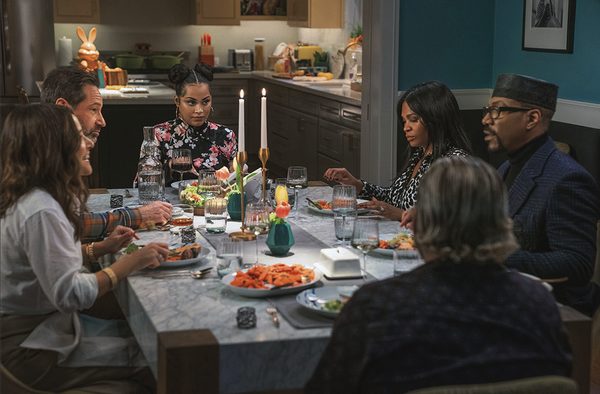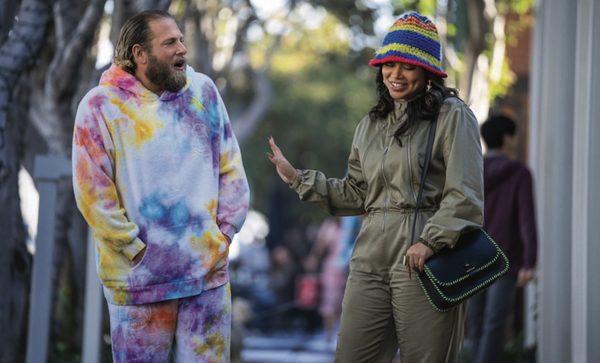You People canned by critics and audiences
You People, which is currently topping Netflix charts, is accused of playing on stereotypes for cheap laughs.
The hit Netflix comedy You People, which explores race relations between the Jewish, Muslim and Black communities in America, has come under fire for allegedly reinforcing antisemitic tropes about Jews being “white, privileged and racist”.
The film, starring Eddie Murphy and Jewish actor Jonah Hill (who also co-wrote it), follows a Jewish man and a Black Muslim woman as they fall in love and attempt to navigate cultural and religious barriers between each other and their families.
It has become a runaway success for the streaming service, gaining more than 55 million viewing hours in its first week. However, some critics have complained that the comedy relies heavily on damaging stereotypes to drum up cheap laughs.
“The Jewish family are positioned as white, privileged and racist. The Black family just has a stern dad. At the end there’s much Jewish apologising for racism. None for antisemitism. That word never appears,” tweeted David Baddiel, author of Jews Don’t Count, a polemic against antisemitism among modern-day progressives.

Allison Josephs, an American Orthodox Jewish influencer and executive director of the nonprofit Jew in the City, accused the movie of conflating white privilege and the Jewish American experience.
Jews depicted in the film “can just call his Jewish family friend” and get a job, she complained on social media. “Because it’s what we all do. We get our jobs with all those Jewish family connections.”
Josephs told US outlet Newsweek that she had spoken with many other Jewish people who are “really, really upset by this movie”.
“There were so many falsehoods, or so many claims put out there without any challenge. And so now that becomes just part of what people may accept to be true. It’s an erasure of Jewish history and an invalidation of all that we’ve been through and all that we continue to go through. It was a really painful movie to watch,” she said.
Writing for the Jewish Telegraphic Agency, Cinthya Silverstein shared her disappointment seeing the film’s monolithic treatment of race and culture and approach to “comedy based on persistent racial ‘othering’”.
The families in the movie, she wrote, bore little resemblance to her own blended family of Mexican and Black Jews.
“In creating the world for You People, the writers continue a dated tradition of movies that overly simplify the worlds they depict based on racial binaries,” she wrote.
Josephs also took aim at Hill for his role in the film. “The only two possibilities are that he’s ignorant, or he is full of so much self-hatred, that he didn’t push back,” she said.
“I think the film is irredeemable,” Josephs added. “And I think it’s horribly damaging, and I think it will increase a division, a wedge between the Black and Jewish community. I think this movie will endanger Jews. I think it’s a really irresponsible movie.”
While Lior Zaltzman, writing for Kveller, said she had high hopes for the movie, especially considering the all-star cast, the potential of You People is “bogged down by cheap, tropey dialogue and flattened-out stereotypes for too many of its characters. For a movie made in 2023, I was almost convinced that some of the jokes and lines came directly from an AI script generator.”
Zaltzman acknowledges that recently, Judaism has received a more nuanced and three-dimensional representation on television, but the film is a complete 180 on that.
“Aside from the fact that it peddles in so many Jewish stereotypes – Ezra works in finance, his mom nags and nags, his bubbe kvetches about his tattoos, his Jewish dad is out of touch, the Jewish women he dates ‘just don’t get him’ – it also deals in some serious misinformation about Jewish people and history,” she wrote, detailing examples of Jews not being able to be buried in a Jewish cemetery if they have tattoos and the accusation that the majority of the American Jewish population arrived with money that they made on the slave trade.
Zaltzman also points to a line, said by Murphy’s character, about Jewish people not being shot by police everyday because “they was out there minding their business”.
As the writer noted, antisemitic attacks around the world, “especially against visibly-presenting Jews, have been on the rise”.
Perhaps her biggest critic though is that the film ignores the existence of Jews of colour.

“The movie doesn’t seem to be aware of their existence, constantly pitting Black people against Jewish people as if there were no crossover there, despite celebrities like Tracee Ellis Ross and Rashida Jones … or the actual star of the movie, Lauren London, who is both Jewish and Black,” Zaltzman wrote.
“It would’ve been nice to acknowledge that Blackness and Jewishness aren’t always mutually exclusive, and would have been a simple solution to help the movie avoid many of the foibles it falls into.”
While many critics have acknowledged that the film is supposed to be a comedy, it’s questionable how so many people – especially with so many Jews intimately involved – let the movie actually happen.
Zaltzman said that one argument may be that the movie represents a specific brand of the Jewish experience in America and that the makers of the movie didn’t know that it would be released during a time of such fraught antisemitism.
But, she said, “The movie does a disservice to its very funny and very talented cast … when it comes to Judaism, it is problematic representation at best, and harmful perpetuation of misinformation at worst.”
With Times of Israel
and Kveller


comments